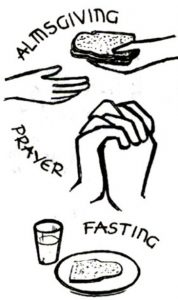by Rev. Antony W. Ball

Lent is the name for the period of forty days leading up to Easter, beginning on Ash Wednesday, which this year is on February 17th but, of course, there’s much more to it than that. Almost certainly the ‘forty days’ comes from time Jesus spent in the desert or wilderness at the start of His ministry, although there are also echoes of the forty years the Israelites were in the desert with Moses. Traditionally Lent is associated with those three elements (almsgiving, prayer and fasting) and how they should be heightened as we prepare for Easter, but firstly we need to ask ourselves why Easter itself calls for such an extended period of preparation – and that depends on the resurrection.
The resurrection is absolutely crucial for our faith – at St. Paul put it in his first letter to the Church at Corinth (1 Cor xv 12-14 NEB):
Now if this is what we proclaim, that Christ was raised from the dead,
how can some of you say there is no resurrection of the dead?
If there be no resurrection, then Christ was not raised;
and if Christ was not raised, then our gospel is null and void and so is your faith…
…so if we deny the resurrection we simply cannot be Christians – simple as that!
Now we begin to see both why we need this extended period of preparation before we celebrate the crucifixion and resurrection and how we can fulfil that preparation – we’re back to that triplet of almsgiving, prayer and fasting during Lent. Those are the three ways we become more faithful Christians – by consciously reviewing each of those aspects of the way we live our lives. Almsgiving can be extended to cover ‘good works’ of almost any kind – the ‘giving’ need not be of money – we should reconsider how we spend our time and what efforts we make in the service of others. Similarly our prayers can become, if we’re not careful, little more than mindless repetitions of various phrases which gradually lose their meaning – we should be listening to God rather than just talking to Him (easier said than done, of course). Even fasting can become little more meaningful than ‘going on a diet’ unless we remember why we’ve stopped eating or drinking whatever-it-is.
So let’s spend the next couple of weeks before Ash Wednesday thinking about both how and why we’re going to ‘celebrate’ or ‘observe’ Lent this year. Our Christian faith requires us to believe/accept something which non-Christians think is absolutely absurd: that one Man, Jesus Christ, rose from the dead and empowers by His Holy Spirit all we who continue to follow Him. That’s not easy to believe/accept – arguably if it were then it would not be worth believing – but we who are Christians need to discipline ourselves during Lent.